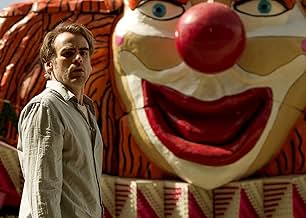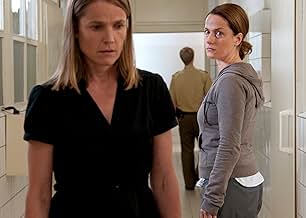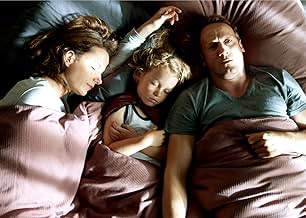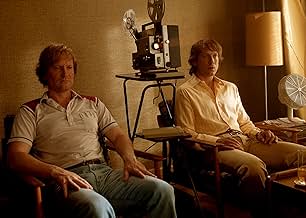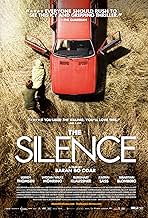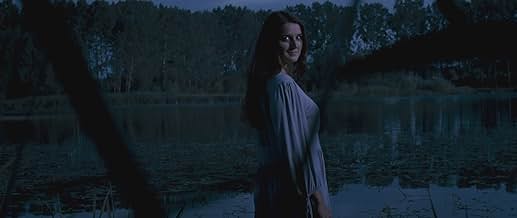IMDb RATING
6.9/10
8.8K
YOUR RATING
13-year-old Sinikka vanishes on a hot summer night. Her bicycle is found in the exact place where a girl was killed 23 years ago. The dramatic present forces those involved in the original c... Read all13-year-old Sinikka vanishes on a hot summer night. Her bicycle is found in the exact place where a girl was killed 23 years ago. The dramatic present forces those involved in the original case to face their past.13-year-old Sinikka vanishes on a hot summer night. Her bicycle is found in the exact place where a girl was killed 23 years ago. The dramatic present forces those involved in the original case to face their past.
- Director
- Writers
- Stars
- Awards
- 1 win & 4 nominations total
Amon Wendel
- Malte
- (as Amon Robert Wendel)
Lena Klenke
- Sinikka
- (as Anna-Lena Klenke)
Helene Luise Doppler
- Pia
- (as Helene Doppler)
- Director
- Writers
- All cast & crew
- Production, box office & more at IMDbPro
6.98.8K
1
2
3
4
5
6
7
8
9
10
Featured reviews
An outstanding crime, thriller from Germany
When the bicycle of a 13-year-old Sinikka is discovered in the exact same wheat field where a heinous murder/rape took place 23 years prior, retired police detective Krischan senses that the two crimes are connected, and vows to bring the killer to justice. The fact that Krischan was unable to catch the killer two decades prior still haunts him to this very day, but perhaps with the help of ambitious young officer David, this time he will find a way to bring closure to the case. Later, as the investigation begins and a sweltering summer heat wave washes over the town, the young victim's parents begin to experience an overwhelming sense of dread concerning a clean cut husband and father who had recently visited their home.
This slow-paced thriller is stunning by all means. The characterization is very well done and cinematography is amazing showing the semi-rural countryside of Germany, the camera angles are fantastic explaining many things about the characters.
The narration is amazing because it has so many ends to tie and agony of the characters has been portrayed impeccably. The direction is watertight; everything is well placed and told significantly.
An original thriller from Swiss born Baran bo Odar, kudos to him.
Recommended to quality cinema lovers.
8/10
This slow-paced thriller is stunning by all means. The characterization is very well done and cinematography is amazing showing the semi-rural countryside of Germany, the camera angles are fantastic explaining many things about the characters.
The narration is amazing because it has so many ends to tie and agony of the characters has been portrayed impeccably. The direction is watertight; everything is well placed and told significantly.
An original thriller from Swiss born Baran bo Odar, kudos to him.
Recommended to quality cinema lovers.
8/10
Familiar story of murder and small-town secrets
THE SILENCE is a German murder mystery that's heavily indebted to two separate sources: firstly, the whole look and mood of the currently-popular Scandinavian cop shows (such as THE KILLING), from which the style of music is frequently ripped off (like that whole thing with a single, deep note held for a while). Meanwhile, the plot and police investigation bear more than a hint of the exceptional South Korean drama, MEMORIES OF MURDER.
What follows is predictable but occasionally highly gripping, and strangely enough different sub-plots in the movie have different levels of interest. I admit that I found the whole police investigation to be pretty dull; there isn't actually much investigating taking place, and it all seems very slow and stately. The scenes of grieving parents are so familiar by now that they didn't affect me at all.
A second, alternate part of the film follows the friendship between two men, one of whom is a paedophile and murderer. This part of the film is exceptionally, dealing with dodgy subject matter in an intensely gripping way. Ulrich Thomsen (from THE THING remake) and Wotan Wilke Mohring are both very good here, and I would have much preferred the whole film to concentrate on these two by doing away with the predictable police stuff altogether. However, what we're left with is a real film of two halves; one's powerful stuff indeed, and the other's best forgotten.
What follows is predictable but occasionally highly gripping, and strangely enough different sub-plots in the movie have different levels of interest. I admit that I found the whole police investigation to be pretty dull; there isn't actually much investigating taking place, and it all seems very slow and stately. The scenes of grieving parents are so familiar by now that they didn't affect me at all.
A second, alternate part of the film follows the friendship between two men, one of whom is a paedophile and murderer. This part of the film is exceptionally, dealing with dodgy subject matter in an intensely gripping way. Ulrich Thomsen (from THE THING remake) and Wotan Wilke Mohring are both very good here, and I would have much preferred the whole film to concentrate on these two by doing away with the predictable police stuff altogether. However, what we're left with is a real film of two halves; one's powerful stuff indeed, and the other's best forgotten.
And no one dared disturb the sound of silence
"Das Letzte Schweigen" a.k.a. "The Silence" is a sleeper thriller that genuinely shocked and dumbfounded me, but mainly AFTER it was finished! It's the type of film that slowly gets under your skin and the true horror of the plot only hits you afterwards, because you are subconsciously analyzing and re-processing the agitating events over and over again. It was quite a harsh confrontation for me, especially because I'm into dark and devastating horror & cult cinema for nearly two decades now and I have seen numerous of allegedly controversial movies. But "The Silence" is largely different to anything I have ever seen before. It's an extremely slow and moody tale full of totally messed up characters (not a single one qualifies as even remotely normal) and horrifying events & themes that are depicted in a nihilistic and almost everyday fashion. The plot gradually unfolds and the viewer absorbs everything that is coming at him/her, but the truly evil nature of the denouement and the injustice of the climax only hit you – and quite hard, I may add - once the end credits are rolling over the screen. The story starts in a remote little German town in the summer of 1986. Two young men, who share the disgusting passion of watching child pornography (it's not explicitly shown but clearly suggested), are driving around in their red Volkswagen when they spot an 11-year-old girl bike-riding on a dirt road. One of them, Peer Sommer, viciously rapes and murders the defenselessly screaming girl while his pal Timo remains motionless and petrified in the car. Shortly after the incident, Timo flees away from Peer in an attempt to forget everything that has happened and start a new life elsewhere. 23 years later, on the exact same day and on the exact same place, the bicycle and a couple of blood stains of 13-year-old Sinikka Weghamm are discovered. The disappearance of the girl is a nightmare for her parents, but also for the mother of the still unsolved previous murder case as well as for the police officers – retired and incompetent new ones – that are charged with the case. Is it the work of a copycat killer or has the original killer returned? The truth is even more nightmarish than anything you can think of. "The Silence" benefices from a continuously foreboding atmosphere and the gradually revealed details of the case make you uncomfortable. At several points during the movie, you'll find yourself cursing and screaming at the screen in an attempt to speed up the slow police investigation. Themes like child murder and pedophilia automatically make any thriller disturbing, but the sober tone and bleak characters in "The Silence" are almost unbearable. Young director Baran Bo Odar maintains the nail-biting ambiance throughout the entire film and all the acting performances, particularly those of Ulrich Thomsen and Wotan Wilke Möhring, are deeply impressive. There are definitely some plot holes to detect regarding the police investigation and the involvement of the media, but somehow it feels like a factual murder case really could be as ineptly led as this one. The total absence of music, humor and certain background explanations only make the film more haunting. This definitely isn't viewing material for everyone, but highly recommended to thriller fanatics in search of a mature and complex story.
Where past sins always come back to haunt.
Most murders are committed by people who know their victim, a fact that is standard fare in most whodunits. Rarely are murders committed at random, although the recent horrific thriller Funny Games (1997, remade 2007) presents the worst possible scenario.
But random murders do occur in real life: all over the world, people disappear and forever remain 'dead' with family and friends who are forever in limbo, unable to achieve closure. Only sometimes are the perpetrators caught.
With that thematic background, The Silence presents just that scenario with the rape and murder of a young female teen that remains on the books of the local police for 23 years – until it happens again to another teen, on the same day of the year, at the same place, and with the same modus operandi.
Unlike other serial killer movies – for example, The Silence of the Lambs (1991) – we know the identity of the killer from the get-go. Moreover, we also immediately know there are two perpetrators, although one of them is obviously reluctant to participate, even passively as he watches. As the two criminals, Ulrich Thomsen (as Peer Sommer) and Woltan Mohring (as Timo Friedrich) give strong and believable performances that center upon their individual but similar proclivities for depravity: brave actors both to take on such abhorrent roles.
But why a gap of 23 years? Well, that's where the story really starts, after we see the first murder in the first five minutes. And when the second murder occurs, so also occurs the retirement party for the local police detective (Krischan Mittich played by Burghart Klaussner) who failed to solve the first; so also the return to duty of an eccentric, grieving, widowed officer (David Jahn played by Sebastian Blomberg) who is obviously still distraught by the loss of his wife (to cancer) and who engages in bizarre activity; and so also the emotional awakening of the mother of the first murdered teen (Elena Lange played by Katrin Sass), who has been locked in unrelenting grief for over twenty years.
And in that mix there is repressed and introverted Timo – now a successful architect, beautiful home, lovely wife, two munchkins, the works – who, when he reads about the second murder, knows immediately who it is and decides something must be done But, what?
As the police investigate, and as the clues are revealed, the net – so to speak – tightens without the two miscreants knowing. But, as viewers, we know it all, and gradually we move to the edge of our seat as we see how the wrong decisions are made, how the wrong inferences are drawn, how actions by one can be misconstrued by another all too easily, and ultimately how facts can be ignored or discarded for political expediency or professional jealousy and for the need to close a case, once and for all.
Arguably, suspenseful story doesn't get much better than this; although some viewers might argue about narrative holes and coincidence. However, because it's so believable it's so much better, especially the ending which I'm sure many – maybe most – viewers will not see coming, including me. Only in the last thirty seconds, perhaps when the full irony hits you between the eyes.
The setting is semi-rural, ordinary and faultless; the production is well paced, even at two hours; the dramatic acting – there is absolutely no comic relief – is flawless; and the direction is so good, well, a glance or look truly is more effective than a thousand words. The background music is appropriate but, at times, borders on clichéd, I think. However, this is a movie I'll watch again – not only for the story but also for the narrative structure that combines so many different threads of lives shattered by indifference, inaction, inadequacy or inconsolable sadness.
Highly recommended.
November 2011.
But random murders do occur in real life: all over the world, people disappear and forever remain 'dead' with family and friends who are forever in limbo, unable to achieve closure. Only sometimes are the perpetrators caught.
With that thematic background, The Silence presents just that scenario with the rape and murder of a young female teen that remains on the books of the local police for 23 years – until it happens again to another teen, on the same day of the year, at the same place, and with the same modus operandi.
Unlike other serial killer movies – for example, The Silence of the Lambs (1991) – we know the identity of the killer from the get-go. Moreover, we also immediately know there are two perpetrators, although one of them is obviously reluctant to participate, even passively as he watches. As the two criminals, Ulrich Thomsen (as Peer Sommer) and Woltan Mohring (as Timo Friedrich) give strong and believable performances that center upon their individual but similar proclivities for depravity: brave actors both to take on such abhorrent roles.
But why a gap of 23 years? Well, that's where the story really starts, after we see the first murder in the first five minutes. And when the second murder occurs, so also occurs the retirement party for the local police detective (Krischan Mittich played by Burghart Klaussner) who failed to solve the first; so also the return to duty of an eccentric, grieving, widowed officer (David Jahn played by Sebastian Blomberg) who is obviously still distraught by the loss of his wife (to cancer) and who engages in bizarre activity; and so also the emotional awakening of the mother of the first murdered teen (Elena Lange played by Katrin Sass), who has been locked in unrelenting grief for over twenty years.
And in that mix there is repressed and introverted Timo – now a successful architect, beautiful home, lovely wife, two munchkins, the works – who, when he reads about the second murder, knows immediately who it is and decides something must be done But, what?
As the police investigate, and as the clues are revealed, the net – so to speak – tightens without the two miscreants knowing. But, as viewers, we know it all, and gradually we move to the edge of our seat as we see how the wrong decisions are made, how the wrong inferences are drawn, how actions by one can be misconstrued by another all too easily, and ultimately how facts can be ignored or discarded for political expediency or professional jealousy and for the need to close a case, once and for all.
Arguably, suspenseful story doesn't get much better than this; although some viewers might argue about narrative holes and coincidence. However, because it's so believable it's so much better, especially the ending which I'm sure many – maybe most – viewers will not see coming, including me. Only in the last thirty seconds, perhaps when the full irony hits you between the eyes.
The setting is semi-rural, ordinary and faultless; the production is well paced, even at two hours; the dramatic acting – there is absolutely no comic relief – is flawless; and the direction is so good, well, a glance or look truly is more effective than a thousand words. The background music is appropriate but, at times, borders on clichéd, I think. However, this is a movie I'll watch again – not only for the story but also for the narrative structure that combines so many different threads of lives shattered by indifference, inaction, inadequacy or inconsolable sadness.
Highly recommended.
November 2011.
Relentless Study of the Pedophile Mind
Baran bo Odar's film begins almost wordlessly on a sunny day in 1986. Two men driving along in a red car (Ulrich Thomsen, Wotan Wilke Möhring) encounter a young girl riding a bicycle (Helene Doppler). They pursue her into a cornfield where one of the men rapes her, kills her with a blow to the head and dumps her corpse in an adjacent lake.
Fast forward to 2009, and one of the two men (Möhring) has become a successful architect, married with two children, while the other (Thomsen) works full-time as a caretaker. The memory of that traumatic occasion haunts both of them, creating a complicated web of lies, deceit and implication that leads to the murder of another young girl (Anna-Lena Klenke).
The film's title not only refers to the silence practiced by the perpetrators of the original crime in 1986, but also describes other people's state of mind. For twenty-three years the murdered girl's mother (Katrin Sass) has kept silent about her harrowing ordeal; likewise the police inspector (Burghart Klaussner) who was involved in the original investigation but failed to achieve a result. It is only after this lengthy time-lapse that they decide to come out and voice their feelings, as well as trying to reconcile themselves to what happened in the past.
Shot in garishly bright colors (by Nikolaus Summerer) creating a world of apparently endless summer weather that nonetheless appears highly dystopian, THE SILENCE offers an insight into the pedophile mind, which often thinks it is doing nothing wrong, even while taking a perverted pleasure in watching child porn videos. The film also takes a look at the ways in which such people are allowed to flourish in societies that prefer to turn their collective backs on such unpleasant issues in the belief that everyone is fundamentally well-intentioned. bo Odar's film proves precisely the opposite; it is often the outwardly most respectable people that prove the most dangerous.
Fast forward to 2009, and one of the two men (Möhring) has become a successful architect, married with two children, while the other (Thomsen) works full-time as a caretaker. The memory of that traumatic occasion haunts both of them, creating a complicated web of lies, deceit and implication that leads to the murder of another young girl (Anna-Lena Klenke).
The film's title not only refers to the silence practiced by the perpetrators of the original crime in 1986, but also describes other people's state of mind. For twenty-three years the murdered girl's mother (Katrin Sass) has kept silent about her harrowing ordeal; likewise the police inspector (Burghart Klaussner) who was involved in the original investigation but failed to achieve a result. It is only after this lengthy time-lapse that they decide to come out and voice their feelings, as well as trying to reconcile themselves to what happened in the past.
Shot in garishly bright colors (by Nikolaus Summerer) creating a world of apparently endless summer weather that nonetheless appears highly dystopian, THE SILENCE offers an insight into the pedophile mind, which often thinks it is doing nothing wrong, even while taking a perverted pleasure in watching child porn videos. The film also takes a look at the ways in which such people are allowed to flourish in societies that prefer to turn their collective backs on such unpleasant issues in the belief that everyone is fundamentally well-intentioned. bo Odar's film proves precisely the opposite; it is often the outwardly most respectable people that prove the most dangerous.
Did you know
- TriviaDirector Baran bo Odar has said that South Korean movie Memories of Murder (2003) was a big inspiration for this movie.
- GoofsAt the start of the TV interview the clock in the control room counts up to 21:40:11 until a cut. Several short scenes later the same clock is shown, again counting up to 21:40:11.
- SoundtracksPia
written & produced by Michael Kamm, Kris Steininger (as Pas de Deux)
- How long is The Silence?Powered by Alexa
Details
- Release date
- Country of origin
- Official sites
- Language
- Also known as
- Останнє мовчання
- Filming locations
- Production companies
- See more company credits at IMDbPro
Box office
- Budget
- €2,300,000 (estimated)
- Gross US & Canada
- $100,214
- Opening weekend US & Canada
- $7,992
- Mar 10, 2013
- Gross worldwide
- $416,675
- Runtime
- 1h 58m(118 min)
- Color
- Sound mix
- Aspect ratio
- 2.35 : 1
Contribute to this page
Suggest an edit or add missing content


